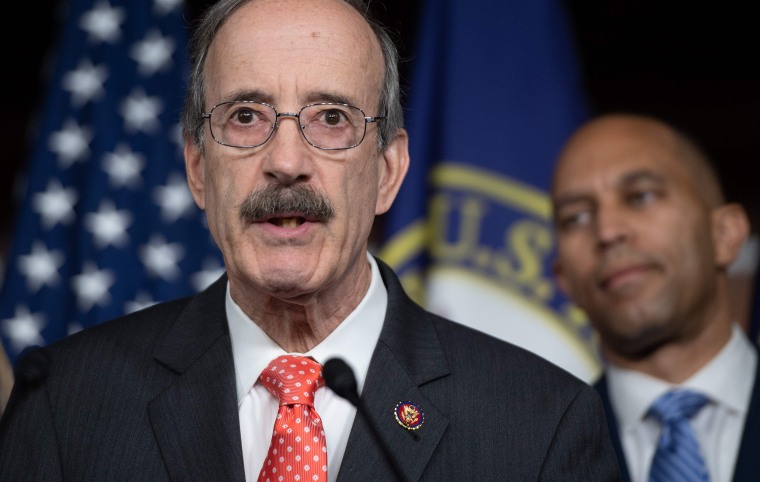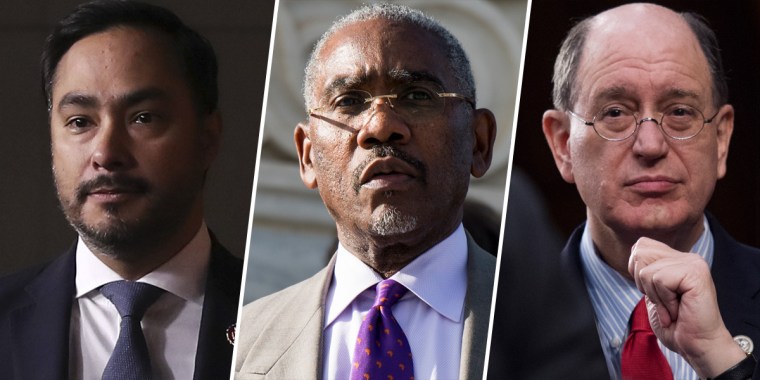WASHINGTON — A battle for control of the powerful House Foreign Affairs Committee is setting up a debate about race, seniority and the future of the Democratic Party.
The vacancy atop a powerful committee was made official Friday when Chair Eliot Engel, D-N.Y., officially lost his congressional seat representing a racially diverse district in a Democratic primary upset by progressive African American Jamaal Bowman, a first-time candidate.
Racial identities and ideological divisions are likely to be front and center in the fight for control of the influential committee with a long history of being run by white men. And the debate will come when the nation is having a reckoning in the wake of protests after the death of George Floyd, which renewed the debate about race and how discrimination has been enshrined in some institutions.
It took weeks for Bowman to be declared the winner, allowing for behind-the-scenes jockeying to begin. Half a dozen House aides, who requested anonymity to offer a frank assessment of the internal discussions, said several candidates are privately discussing seeking the chairmanship but had avoided saying so in public out of respect for Engel while he waited for the official count.
The chairmanship will be decided after the November election, when Congress is likely to be more diverse than it is now and to include more women and minority members. A senior Democratic aide said Speaker Nancy Pelosi of California is expected to stay neutral. A spokesperson for the Foreign Affairs Committee declined to comment.
Brad Sherman of California will be the most senior member of the committee, a position that traditionally would have made him the favorite for the gavel. He is expected to make public soon whether he intends to run, a congressional aide said.

The second-most-senior lawmaker on the panel, Gregory Meeks, D-N.Y., is a prominent member of the Congressional Black Caucus. He became the first to declare his intention to run, releasing a statement Friday saying, "More of the same is not an option."
And Joaquin Castro, D-Texas, lacking the seniority of the two other candidates, is also expected to run. Castro, head of the Congressional Hispanic Caucus, is the identical twin brother of Julián Castro, whose national profile rose when he ran unsuccessfully for the Democratic presidential nomination.
Castro wants the candidates to debate.
"I do think it would benefit both the members of Congress and the American public if people who are running for committee chairs are willing to get out there in front of an audience and tell people what they believe, where they stand and where they intend to take the committee," he said. "I think that would be healthy for everybody. And I also think that that's what Americans are clamoring for, is accountability and transparency."
'Speaks volumes to the world'
In the almost 200 years since the establishment of the House Foreign Affairs Committee, only one chairperson has not been a white man.
Of the 21 House committees, four have Black chairs and two are led by Latinos.
"Having a substantial number of African American committee chairs will speak volumes to the world," said Rep. G.K. Butterfield, D-N.C., former head of the Congressional Black Caucus. "We are not the country that many people in other parts of the world think we are based on the George Floyd embarrassment."
Castro and Meeks are already making the case that their identities would play an important role in how they served as chair.
"Does it make a difference? Yes, I believe, absolutely, it does. That and my ability and my experience," Meeks said. "That is why I believe I am the appropriate person, the right person, at the right time to do this job."

Castro, who is Mexican American, has argued that his background would allow him to focus on issues getting less attention from the committee.
"We hardly have touched the issue of migration of hundreds of thousands of women and children from Central America, to the United States," Castro said. "I have a special interest in that because of my work on immigration and as chair of the Congressional Hispanic Caucus."
'All senior citizens'
Intertwined in the debate about the role of race are new questions about whether allowing seniority to prevail undermines diversity. The written and unwritten rules of Congress have long prioritized seniority.
"The seniority system is now being calibrated against other factors. Other factors are race and gender, I would call it diversity, even age diversity," Butterfield said.
In another committee, all of the candidates for chair but one are likely to be over 70 years old, Butterfield said.
"We don't need committee chairs consisting of all senior citizens," he added.
Castro is aware that he is asking his fellow members to elevate him to a position of power without having logged the usual amount of time in office.
"Look, if it comes down to who's been in the halls of Congress the longest, then I've got no shot," Castro said. "But I would hope the members would look at not only experience but also your vision and your ideas for the committee."
If he is selected, Castro, 45, would be the youngest chair by a decade behind Armed Services Committee Chair Adam Smith of Washington, who is 55.
Meeks said seniority is only part of the consideration.
"Look at the wishes and the will of the folks that are on the committee itself. The person's ability does play a role in who can pull the committee together, " Meeks said. "I think all of those are something that has to be taken into consideration."
Download the NBC News app for breaking news and politics
Unsurprisingly, an aide said Sherman strongly favors the seniority system. Despite being the most senior member, Sherman was passed over when Engel was selected to be chair.
Sherman could use his experience and adversarial demeanor to bolster his candidacy, with an ally arguing that he would also be willing to hold fellow Democrats accountable if Joe Biden wins the presidency.
State Department diversity
As the candidates for chair make their cases to their fellow House members, the issue of diversity at the State Department, which falls under the committee's jurisdiction, is also expected to be a focal point.
Of the 198 ambassadors leading U.S. embassies, three career ambassadors are African American and four are Latino, according to the American Academy of Diplomacy.
"At this moment, people across the globe are protesting systemic racism. That's also true of America's diplomats," Castro said last month. "Foreign service officers and former U.S. ambassadors, particularly Black diplomats, are speaking up about not being treated with equal respect. Diplomats who represent us should represent all of us."
Meeks echoed the sentiment.
"The United States' ability to promote human rights and democratic values across the world is undermined if we don't practice at home what we preach abroad, recognizing that foreign policy is inseparable from domestic policy," Meeks said Friday in announcing his run. "Our international standing has always been linked to our ability to do better at home."
Sherman has also pushed for greater diversity at the State Department, saying it sends a global message.
"People who bring diversity to the State Department will help us more than others," Sherman said last month in a Foreign Affairs Committee hearing. "We'll have a foreign service that reflects America, but it will also undercut the propaganda of our enemies who's saying that America is a place of discrimination and caste."

